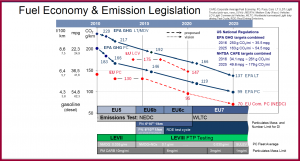
Currently, estimates for the cost of compliance range from zero to $10,000 per vehicle for what is a difficult engineering task. Customer acceptance is another matter ignored by regulators.
The 2015 model year is when auto engineers will be “white water rafting,” meaning, a fast ride as CO2 emissions begin a rapid descent, according to a panel of automotive experts weighing in on the so-called Tier 3 regulations. (See EPA Proposes Stricter Emissions Standards, Lower Sulfur Fuel. Big Battle between Oil and Auto Industries Coming over Tier 3)
Håkan Yilmaz, Vice President, Global Technology Management, Gasoline Systems at mega supplier Bosch, cautioned that the key challenge is not to add costs to vehicles with future technologies, including advanced fuel injection systems. This was during the CAR Breakfast Briefing earlier this week at the Bosch office in Farmington Hills, Mich.
“Currently, estimates for the cost of compliance range from zero to $10,000 per vehicle for what is a difficult engineering task that has become – once again and as always – an ideological battleground, with posturing from automakers, regulators and pressure groups,” according to Ken Zino of AutoInformed.
“The ability of product development engineers and their auto companies to meet the new standards and/or garner credits to offset some vehicle shortfalls will determine the type of vehicle you can buy, and how much you will pay for it,” Zino said. “With safety regulations already on the books potentially adding thousands to the cost of a new vehicle, the social implications for automobility are serious; Moreover, if the implementation of CAFE regulations goes badly it could damage one of the U.S.’s best wealth and job creating industries at a time when growth is desperately needed.” (54.5 in 2025 Subject of Critical CAR CAFE Seminar)
The auto industry is challenged with trying to comply with tough, government emissions and cleaner fuel standards by 2025. Yilmaz stated by the end of this decade, we will see an Evolution of Electrification and predicted the “start-stop coasting” is a cost effective solution with up to 10% of fuel savings. Yilmaz also noted that emissions standards and fuel economy must go together, and that the new regulations are very tough on diesels – a Bosch area of expertise – because the new fuel technologies result in “engine knocks.”
Other members of the panel were Mike Olechiw, with the U.S. Environmental Protection Agency, Stuart Johnson, Senior Manager, Engineering and Environmental Office, Volkswagen Group of America, and Chris Gearhart, a Director at the National Renewable Energy Laboratory. The panel acknowledged the discussion on automotive fuels and emissions does not involve the oil industry, which is lobbying and using every legal challenge possible to contest the low sulfur fuels that are needed to clean up the air.

